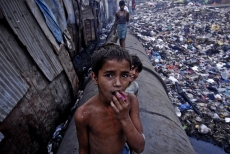The CPD Blog is intended to stimulate dialog among scholars and practitioners from around the world in the public diplomacy sphere. The opinions represented here are the authors' own and do not necessarily reflect CPD's views. For blogger guidelines, click here.
Undersecretary of State for Public Diplomacy James Glassman gave a comprehensive overview of his vision for the next phase of United States public diplomacy during his talk in early December at the New America Foundation.
The much maligned Alhurra, the U.S. government's Arabic TV service, is now a "go-to" news channel in Iraq, one of the largest TV markets in the Middle East of more than 28 million population.
The Brookings Institution's report on its proposed USA-World Trust has unleashed a predictable torrent of criticism from the public diplomacy community. To be sure, not all of the commentary has been negative, but much of it has been. The critics are rehashing many of the same tired arguments that have been used to kill any ideas to deal with today's public diplomacy realities.
I am happy to see that Alvin Snyder is contributing again to the CPD Blog. I have always learned from his experience and have found his views to be interesting and provocative. His return commentary, about a revival of Worldnet, accordingly provoked me to add some thoughts about the possibilities for a public diplomacy television service.
It's unfortunate that President Ronald Reagan's global interactive TV Network, Worldnet, no longer exists as it did two decades ago when he stood at Berlin's Brandenburg Gate and dared Soviet leader Gorbachev to "tear down this wall".
If we consider public diplomacy in the narrower sense, as one government's efforts to speak to the public of another nation, President Bush's visit to Iraq this weekend would be a, well, "fitting" symbol of the state of American PD. He narrowly ducked rage that was aimed at him by a new manner of shoe bomber, one equipped with both ninja skill and ferocity.
MUMBAI -- Following the attacks here two weeks ago, much of the coverage on local media looks familiar: red banner stripes and logos with such phrases as "26/11 Fight against Terrorism". But it is not quite the same as US networks' "War on Terror".
There are "Indians of the Year", mini-package profiles of the soldiers and others who died during the fighting that occurred the week before last just down the street from my hotel, and live coverage of vigils and demonstrations. Also, the attack on Mumbai has been framed as attack on modernity. So far, again, it looks quite familiar.

In the new movie "Slumdog Millionaire" there is a poignant scene that all public diplomacy experts should have etched in their minds. It's of a classroom full of boys in a Mumbai slum inhabited by Moslems passing around one copy of the "Three Musketeers" as part of their English lesson. Later we watch one of those boys evolve into a gangster. He could just as easily have joined Al Qaeda. The scene takes place in the early 1980's, but I suspect that in spite of India's growth that similar scenes can be found today.
Pages
Visit CPD's Online Library
Explore CPD's vast online database featuring the latest books, articles, speeches and information on international organizations dedicated to public diplomacy.
POPULAR ARTICLES
-
March 22
-
February 23
-
February 22
-
April 1
-
April 11
Featured Blogger
Join the Conversation
Interested in contributing to the CPD Blog? We welcome your posts. Read our guidelines and find out how you can submit blogs and photo essays >.








